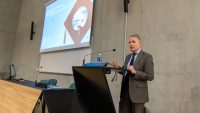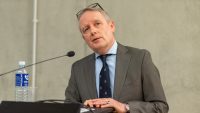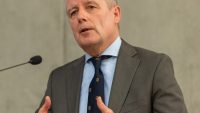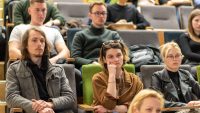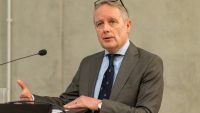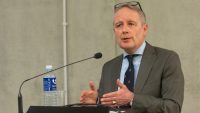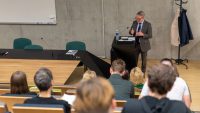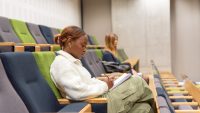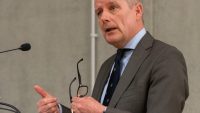Ambassador of Netherlands Held Lecture on Human Rights and Security
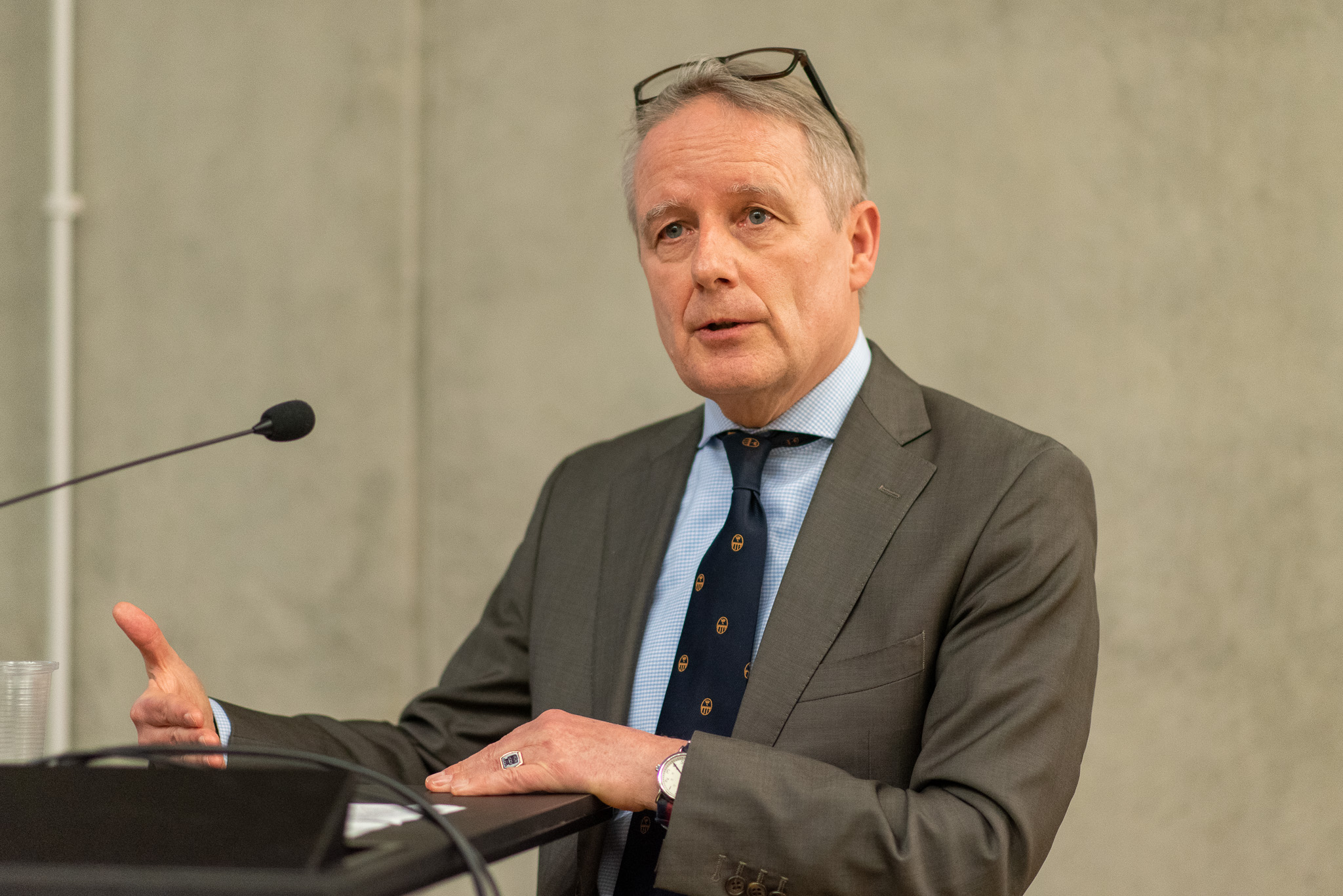
“Human rights and security are not opposites, they complement each other. You can have no true human dignity and consideration of human rights without security. [But] you can’t have your cake and eat it too – something needs to go. The legal framework may be extremely solid, but in real life, events happen where you have to make choices and compromises that do not adhere to human rights standards. In some situations, human rights treaties are not aligned with certain security interests,” says the Ambassador of the Kingdom of the Netherlands to Lithuania, Jack Robert Twiss Quarles Van Ufford, who gave a lecture at Vytautas Magnus University (VMU) on the challenges of ensuring human rights and security.
The Ambassador has extensive experience not only in the diplomatic service but also as the Director of Intelligence at the General Intelligence and Security Service of the Netherlands, making him particularly familiar with security and human rights issues. “From my experience – I served for seven years in Africa (Tanzania and Nigeria) – I think security is a paramount foundation for any kind of development, be it economic, social or in terms of adherence to human rights. Otherwise, people in positions of power abuse their authority, especially against the most vulnerable members of society – families, children, mothers, and the elderly,” says Van Ufford.
The diplomat, who holds a Master’s degree in Social Anthropology from the University of Amsterdam, says he has greatly benefited from these studies in both his current and previous positions. “You learn to look at things from a different perspective. It doesn’t mean that it becomes your perspective, but it helps you. At least it helps me as a diplomat and intelligence officer to try to understand the other person – not necessarily the enemy. Then you can anticipate what to do,” the diplomat notes.
Human rights is not a Eurocentric concept
At the end of the Second World War, when the main human rights treaties were adopted and the United Nations was established, many of the countries at that time were colonies of the British and French empires. According to Van Ufford, this is why, when these countries became independent, their governments began to convince their citizens that the treaties in question were protecting the rights of Europeans rather than human rights.
“I think these are not Eurocentric human rights. When a mother loses a child to war in Africa, her sorrow is as great as that of a Dutch or Lithuanian mother. These are human feelings. Those who claim that this is Eurocentric are in a position of power and do not necessarily care about citizens or their well-being. They use this argument to maintain the imbalance of power in society,” the ambassador notes, while adding that he understands that the mentioned period – the Second World War – marks the beginning of the Soviet occupation of Lithuania, and that only part of Europe, including the Netherlands, was liberated at the end of it.
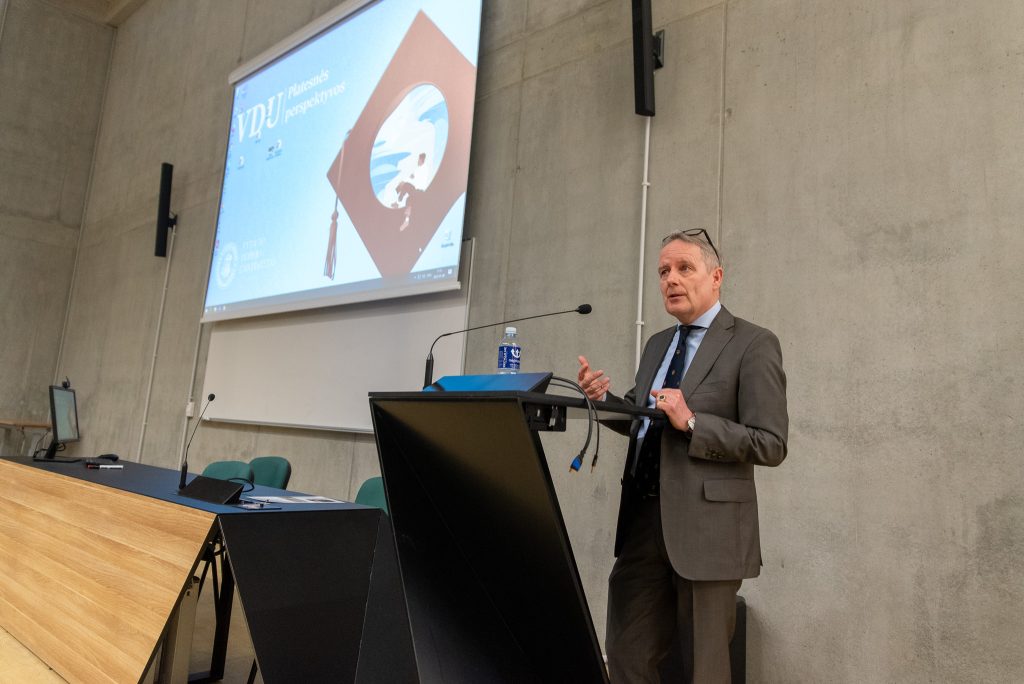
Security opens up opportunities for stability
While discussing the importance of security, the Ambassador of the Kingdom of the Netherlands recalled the example of Peru. He referred to the book “The Other Path” by economist Hernando de Soto and other researchers, which concentrates on Peru’s informal economy and how it became dominant in the country due to rigid bureaucratic barriers and the lack of legal structures that prevented ordinary citizens from owning property rights. The study participants, who were slum dwellers, were given property and land rights, which incentivised them to invest in their surroundings: water supply, roads, and waste collection.
“All this was unthinkable before. Another slum, which was not part of the study, remained as it was – poor, with a high crime rate. This shows what security can do – security in the wider sense: a proper legal framework, functioning court system, legislation. This opens up opportunities for stability that allow people to make calculated decisions regarding family, business, and investment,” says Van Ufford.
Recalling the illegal migration crisis in Lithuania
In his lecture, the guest also recalled the crisis in Lithuania that took place in the summer of 2021, when large flows of illegal migrants tried to enter the country. At the centre of this crisis was also the conflict between human rights and security. “This was an obvious attempt by Lukashenko to destabilise Lithuania, Latvia, and Poland. Understandably, Lithuania was not prepared for this and had to take temporary measures, restricting people’s freedom for a time. Of course, the authorities want to adhere to human rights and dignity regulations which we all adhere to in the EU, but on the other hand, they were confronted with potential destabilisation – no idea who is entering the country and from where, Trūksta parametro "slug". Meanwhile, understandably, NGOs were angry about the temporary restrictions on human rights,” the diplomat explains, describing the parties involved in the conflict.
Recalling his previous work in the field of intelligence, the Ambassador also discussed privacy issues, specifically the laws that permit security and intelligence agencies to breach a person’s privacy under specific circumstances. “The ability to access a phone, see all communications, remotely turn on a microphone and listen to you – all of this is extremely useful for intelligence, because it can help prevent terrorist attacks,” he notes, pointing out that the Dutch General Intelligence and Security Service was working to prevent attacks similar to the horrific attack on the Bataclan theatre in Paris.
The lecture also touched upon the topic of religion and freedom of expression. The Ambassador of the Kingdom of the Netherlands to Lithuania recalled how a film that offended Muslims was released in his country. Although attempts were made to prevent it from being shown, the authorities decided that it would have violated freedom of expression. Unfortunately, after the film’s release, its director was murdered. “In my opinion, freedom of speech is not absolute, and this case showed that,” the Ambassador concludes.
The Ambassador Extraordinary and Plenipotentiary of the Kingdom of the Netherlands to Lithuania, Jack Robert Twiss Quarles Van Ufford, delivered a public lecture-discussion “Human Rights and Security Implementation Challenges in the Contemporary World” at Vytautas Magnus University.
The Ambassador holds a Master’s degree in Social Anthropology from the University of Amsterdam. He began his diplomatic career in 1990 at the Ministry of Foreign Affairs of the Kingdom of the Netherlands. Since then, he has worked at Dutch embassies in Tanzania, Nigeria, and the US, and was the Head of the Netherlands Representative Office in the Palestinian Territories. From 2011 to 2016, he served as the Foreign Policy and Defence Adviser to the Prime Minister of the Netherlands. From 2016 to 2022, he was the Director of Intelligence at the General Intelligence and Security Service of the Netherlands. Since 2022, he has been serving as the Ambassador Extraordinary and Plenipotentiary of the Kingdom of the Netherlands to Lithuania.

